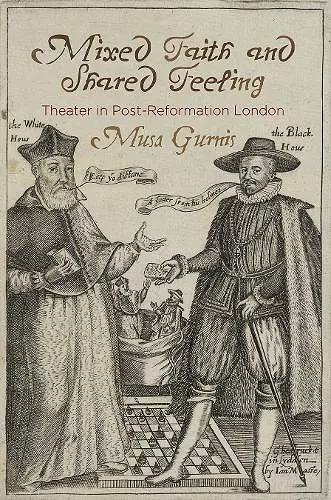Mixed Faith and Shared Feeling
Theater in Post-Reformation London
Format:Hardback
Publisher:University of Pennsylvania Press
Published:10th Oct '18
Currently unavailable, and unfortunately no date known when it will be back

Mixed Faith and Shared Feeling explores the mutually generative relationship between post-Reformation religious life and London's commercial theaters. By engaging with dramatic texts and performance practices, Musa Gurnis demonstrates how early modern theater drew mixed-faith playgoers into new relations with a complex religious culture.
Mixed Faith and Shared Feeling explores the mutually generative relationship between post-Reformation religious life and London's commercial theaters. It explores the dynamic exchange between the imaginatively transformative capacities of shared theatrical experience, with the particular ideological baggage that individual playgoers bring into the theater. While early modern English drama was shaped by the polyvocal, confessional scene in which it was embedded, Musa Gurnis contends that theater does not simply reflect culture but shapes it. According to Gurnis, shared theatrical experience allowed mixed-faith audiences to vicariously occupy alternative emotional and cognitive perspectives across the confessional spectrum.
In looking at individual plays, such as Thomas Middleton's A Game of Chess and Shakespeare's Measure for Measure, Gurnis shows how theatrical process can restructure playgoers' experiences of confessional material and interrupt dominant habits of religious thought. She refutes any assumption that audiences consisted of conforming Church of England Protestants by tracking the complex and changing religious lives of seventy known playgoers. Arguing against work that seeks to draw fixed lines of religious affiliation around individual playwrights or companies, she highlights the common practice of cross-confessional collaboration among playhouse colleagues. Mixed Faith and Shared Feeling demonstrates how post-Reformation representational practices actively reshaped the ways ideologically diverse Londoners accessed the mixture of religious life across the spectrum of beliefs.
"Mixed Faith and Shared Feeling deftly challenges oversimplified confessional assumptions about people of the period by demonstrating through a wide array of lenses and perspectives the nuances of post-Reformation political, social, and religious practices. Through meticulous, sophisticated study, the author details how the power of theater shapes and is shaped by audiences of the time to reveal 'a way of moving around, inside and out of, between, or aslant of rigid confessional binaries.' This volume requires careful reading for students and scholars of drama. It is a remarkable resource for our time." * Seventeenth-Century News *
"Musa Gurnis's Mixed Faith and Shared Feeling is a deeply researched, methodologically sophisticated, and interpretively compelling intervention in current studies of the relationship between the post-Reformation religious landscape and the late sixteenth- and early seventeenth-century commercial drama . . . In its willingness to tackle a range of critical and historical positions and in its learned mixing of theater history, performance theory, and materialist criticism, Mixed Faith and Shared Feeling is an impressive, exciting work. Perhaps most impressive is its eloquent conviction about the role of the stage not merely in reinforcing but in actually fostering the audience's creativity and interpretive flexibility. It is a flexibility that Gurnis herself demonstrates everywhere throughout the monograph." * Journal of the American Academy of Religion *
"Lucidly argued, elegantly written, and grounded in sophisticated readings of the plays it examines, Mixed Faith and Shared Feeling offers an important contribution to the literature on the impact of the Reformation on early modern English stage culture . . . [Gurnis'] vindication of 'classical' materialism over the current, depoliticized (and, one might add, intellectually rather opaque) forms of neomaterialist theory reads as timely and urgent. Gurnis's passion and conviction have resulted in a remarkable book." * Modern Language Review *
"Gurnis offers a fascinating reevaluation of how dramatists writing for the commercial English theatre responded to the divisions within and plurality of post-Reformation Christianity. This subject has attracted considerable scholarly attention in recent years, but Gurnis’s monograph represents a unique and valuable contribution to the field." * Theatre Journal *
"Mixed Faith and Shared Feeling is an unusually compelling book. It is artfully conceived and exhaustively researched and takes its readers on a thoroughly engaging, wide-ranging, and profoundly interactive journey through the material-confessional on the one hand, theatrical on the other. And it does this in a way that successively explodes a number of received ideas and unexamined myths, chief among which is that card-carrying Puritans never attended, much less tolerated, public theater plays." * Thomas Cartelli, Muhlenberg College *
"Focusing on the confessional, social, and political dimensions of post-Reformation theater in early modern England, Mixed Faith and Shared Feeling brings together a broad and deep familiarity with early modern drama as well as a deft understanding of the ways in which theatrical form and performance can shape individual and collective identities." * Steven Mullaney, University of Michigan *
ISBN: 9780812250251
Dimensions: unknown
Weight: unknown
272 pages